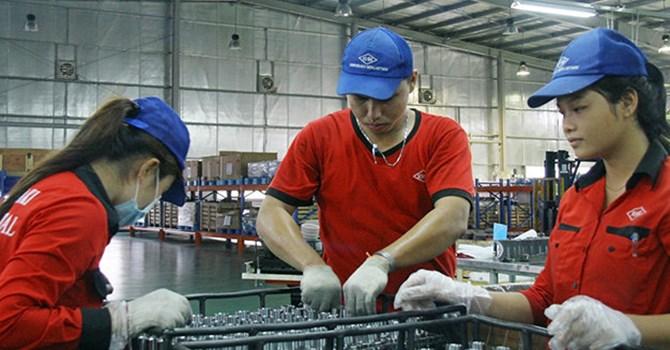|
Will Vietnam replace China to become the world’s industrial
center?
Vietnam will become a new industrial center in the world, while its
products such as footwear and garments will enjoy big benefits when TPP takes
effect.
 The comment was heard at many conferences and workshops which discussed Vietnam’s industry development in the TPP period. Officials believe that TPP, plus the institutional reform being carried out by Vietnam, will make this ‘quite realistic’. Garments and footwear are believed to be the biggest beneficiaries from the free trade agreement. However, while government agencies are optimistic about the future of Vietnam’s industry in the TPP period, economists are cautious when talking about the issue. “It would be better not to cherish the delusion that Vietnam would replace China to become an industrial production center of the world,” an analyst said. “It is even difficult for Vietnam to grab parts of the opportunities to be brought by TPP,” he said. Bui Ngoc Son from the Institute of Economics and Politics Research pointed out that with what Vietnam has, it is difficult to take full advantage of the opportunities.
“The technologies used in enterprises are outdated, the
material facilities are poor. Meanwhile, workers are not skilled and the
administrative procedures are complicated,” he commented.
The expert went on to say that when joining free trade agreements (FTAs), Vietnam is only well prepared for negotiations. “Businesses have vague knowledge about TPP. Many of them don’t understand what TPP means,” he said. “How can Vietnamese businesses join the global value chain and take full advantages of the FTAs if they don’t know anything about TPP and FTAs?” he said. “The health of businesses remains weak. Many problems still exist in technology transfer,” he said. Transferring technologies is always a heady question for Vietnam. The country tries to attract foreign direct investment (FDI), hoping that foreign investors would transfer technologies to Vietnamese businesses. However, the analyst said that Vietnam was ‘innocent’ if it hoped that it would receive what it wants. “Foreign investors won’t do this if they don’t have to,” he said. In China, foreign investors won’t bear big disadvantages, including heavy taxes, if they refuse to transfer technologies to Chinese businesses. Meanwhile, Vietnam does not apply any policies to force foreign investors to transfer technologies. Ngo Quy Nham from OCD, a consultancy firm, also doubts government officials’ statement that Vietnam would receive big benefits from TPP. “It is even difficult for Vietnamese businesses, 98 percent of which are small and medium, to exist in the TPP period, let alone to get benefits from TPP,” Nham said.
Dat Viet
|
Thứ Bảy, 19 tháng 3, 2016
Đăng ký:
Đăng Nhận xét (Atom)
Không có nhận xét nào:
Đăng nhận xét